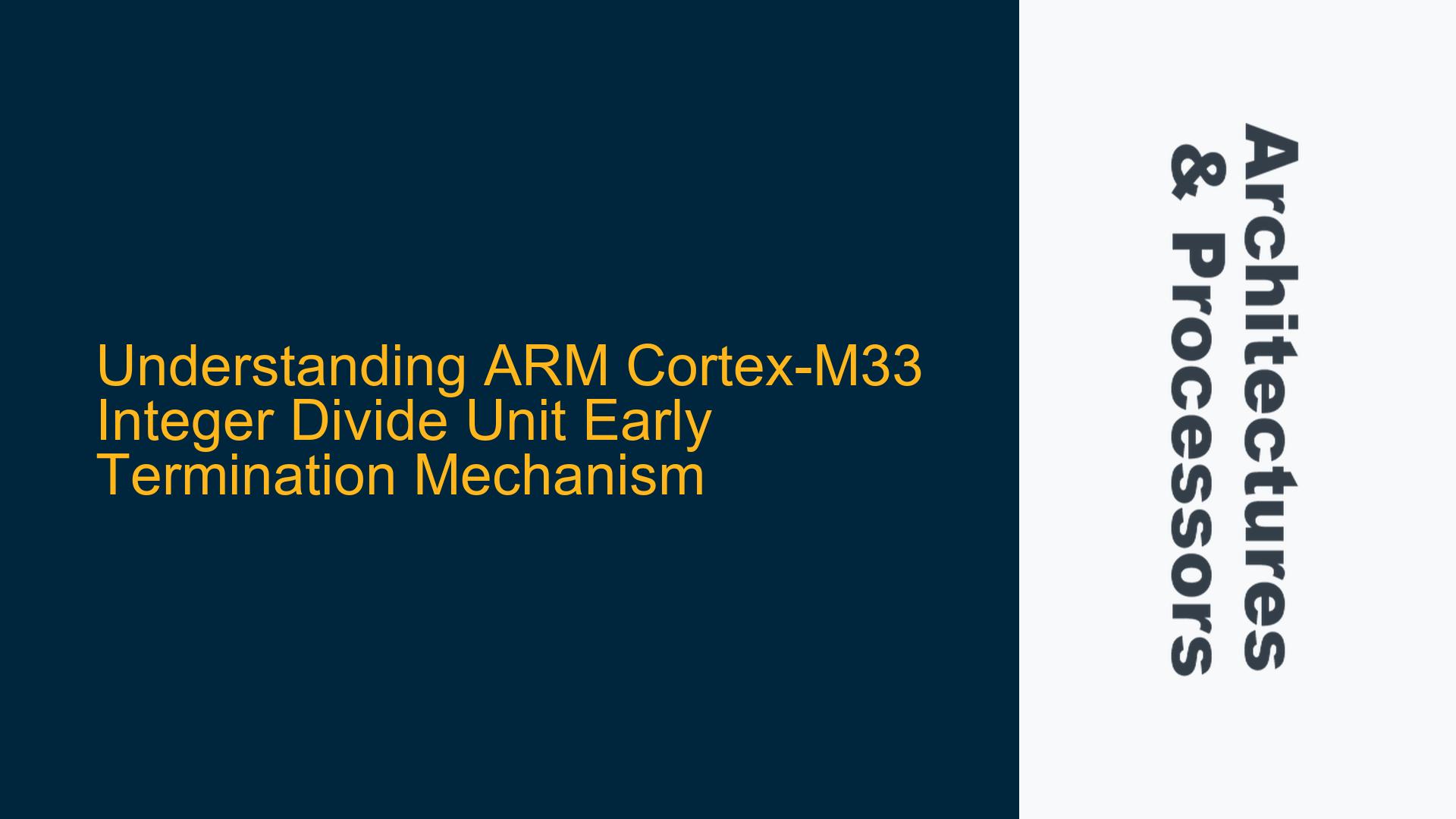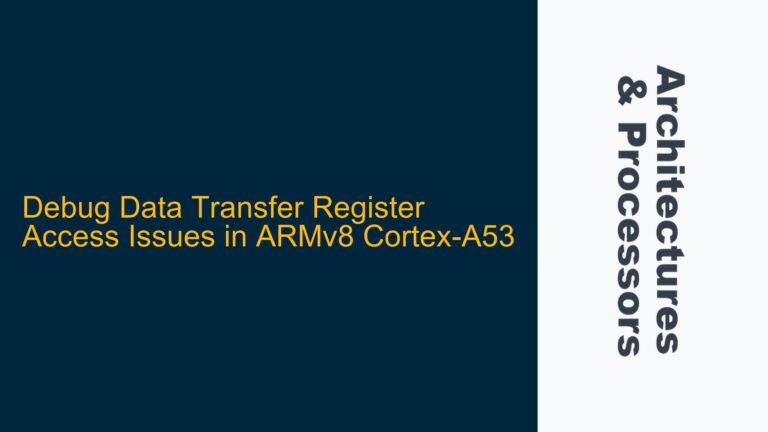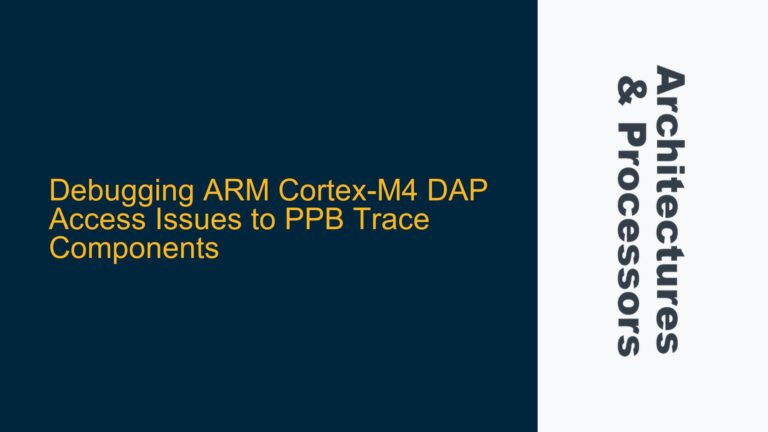ARM Cortex-M33 Integer Divide Unit and Operand-Dependent Early Termination
The ARM Cortex-M33 processor features an integer divide unit that supports operand-dependent early termination, a mechanism designed to optimize division operations by reducing the number of cycles required for certain division scenarios. This feature is particularly useful in embedded systems where performance and power efficiency are critical. The integer divide unit accelerates division operations by terminating the process early under specific conditions, such as division by zero or when the divisor is greater than the dividend. This early termination mechanism is operand-dependent, meaning it relies on the values of the operands involved in the division operation.
The integer divide unit in the Cortex-M33 is a hardware block that performs integer division operations, which are computationally expensive compared to addition or multiplication. Division operations typically require multiple clock cycles to complete, and the exact number of cycles depends on the bit-width of the operands and the specific algorithm used. The Cortex-M33’s integer divide unit implements a smart optimization that reduces the number of cycles required for division when certain conditions are met. This optimization is referred to as "operand-dependent early termination."
Operand-dependent early termination works by monitoring the values of the dividend and divisor during the division process. If the divisor is zero, the division operation is terminated immediately, as division by zero is undefined and would result in an error. Similarly, if the divisor is greater than the dividend, the division operation is terminated early because the result would be zero. Additionally, during the iterative process of division, if the remaining dividend becomes smaller than the divisor, the operation is terminated early, as further iterations would not change the result.
This mechanism is particularly beneficial in scenarios where division operations are frequent, and the operands often meet the conditions for early termination. By reducing the number of cycles required for division, the Cortex-M33 can achieve higher performance and lower power consumption, which are critical factors in embedded systems.
Conditions Triggering Early Termination in Integer Division
The early termination mechanism in the Cortex-M33 integer divide unit is triggered by specific conditions related to the operands involved in the division operation. These conditions are designed to detect scenarios where further computation is unnecessary, allowing the division process to be halted early. The primary conditions that trigger early termination are division by zero, divisor greater than dividend, and remaining dividend smaller than divisor during iterative division.
Division by zero is a fundamental error condition in arithmetic operations. When the divisor is zero, the result of the division is undefined, and attempting to perform such an operation would typically result in a hardware exception or an incorrect result. The Cortex-M33 integer divide unit detects this condition early and terminates the operation immediately, preventing any adverse effects on the system. This early detection and termination mechanism ensures that the processor can handle division by zero gracefully, either by raising an exception or by returning a predefined result, depending on the system configuration.
Another condition that triggers early termination is when the divisor is greater than the dividend. In this case, the result of the division operation is zero, as the divisor cannot fit into the dividend even once. The Cortex-M33 integer divide unit recognizes this condition and terminates the division process early, avoiding unnecessary computation. This optimization is particularly useful in scenarios where the divisor is often larger than the dividend, such as in certain types of mathematical algorithms or data processing tasks.
During the iterative process of division, the integer divide unit continuously compares the remaining dividend with the divisor. If the remaining dividend becomes smaller than the divisor, the division operation is terminated early, as further iterations would not change the result. This condition is detected dynamically during the division process, allowing the unit to halt computation as soon as it becomes clear that the result has been determined. This dynamic early termination mechanism further enhances the efficiency of the integer divide unit, reducing the number of cycles required for division operations.
Optimizing Division Operations with Early Termination Mechanisms
To fully leverage the benefits of the operand-dependent early termination mechanism in the Cortex-M33 integer divide unit, developers should understand how to optimize their code to take advantage of this feature. This involves writing code that maximizes the likelihood of early termination conditions being met, as well as understanding the implications of these optimizations on system performance and power consumption.
One approach to optimizing division operations is to structure the code in such a way that the conditions for early termination are more likely to occur. For example, if the application frequently performs division operations where the divisor is often greater than the dividend, the integer divide unit will frequently terminate the operation early, resulting in significant performance gains. Developers can achieve this by carefully designing their algorithms and data structures to minimize the number of division operations where the divisor is smaller than the dividend.
Another optimization strategy is to use conditional checks to avoid unnecessary division operations altogether. For instance, before performing a division operation, the code can check whether the divisor is zero or greater than the dividend. If either condition is true, the code can skip the division operation and handle the result directly. This approach not only reduces the number of division operations but also ensures that the integer divide unit is used efficiently.
In addition to code-level optimizations, developers should also consider the impact of early termination on power consumption. By reducing the number of cycles required for division operations, the integer divide unit consumes less power, which is particularly important in battery-powered devices. Developers can further enhance power efficiency by minimizing the frequency of division operations and by using alternative algorithms or data structures that require fewer divisions.
To illustrate the benefits of early termination, consider the following example. Suppose an application performs a large number of division operations as part of a data processing task. If the divisor is often greater than the dividend, the integer divide unit will frequently terminate the operations early, resulting in a significant reduction in the total number of cycles required for the task. This reduction in cycles translates directly into improved performance and lower power consumption.
In conclusion, the operand-dependent early termination mechanism in the Cortex-M33 integer divide unit is a powerful optimization that can significantly enhance the performance and efficiency of division operations in embedded systems. By understanding the conditions that trigger early termination and by optimizing their code to take advantage of these conditions, developers can achieve substantial improvements in system performance and power efficiency. This mechanism is a testament to the advanced architectural features of the Cortex-M33 processor, which is designed to meet the demanding requirements of modern embedded applications.






